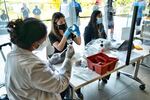Facing a monkeypox vaccine shortage, the Oregon Health Authority is stretching its supply.
Health educators in Multnomah County are encouraging men who have sex with men, presently the primary group impacted by the virus, to take preventive measures if they can’t get a vaccine.
Those include being on the lookout for any new sores or bumps, avoiding contact with others if you notice symptoms, and getting tested.
In Multnomah County, where Oregon’s outbreak is currently concentrated, more than 1,500 people who qualify for the vaccine are on a waitlist due to the shortage of doses, and that list is growing by about 100 people a day, according to a county spokesperson.
In order to reach as many people as possible with the almost 3,500 doses the state has received so far, the Oregon Health Authority is giving most people a single shot and holding off on boosters.
The vaccine is usually given as a two-dose series, with a booster 28 days after the first shot.
“The goal is to increase community immunity as rapidly as possible and provide as much vaccine to as many people who can benefit as quickly as possible,” said Dr. Tim Menza, a senior adviser with the Oregon Health Authority.
The Oregon Health Authority plans to provide people with booster doses two or three months after their first doses, as more vaccines become available.
It’s a strategy that’s endorsed by the vaccine’s manufacturer. Clinical data suggests a single shot gives people immunity to the monkeypox virus that lasts over a year. New York, Colorado and San Francisco are also using the single-dose strategy.

Registered pharmacist Sapana Patel, left is joined by USC pharmacy intern Gizelle Mendoza, as they load syringes at a Pop-Up Monkeypox vaccination site on Wednesday, Aug. 3, 2022, in West Hollywood, Calif.
Richard Vogel / AP
Most cases in Oregon to date have been in men who have sex with men, consistent with global trends.
In data published by the WHO, information on sex is available for about three-quarters of cases. About 99% of those cases are men. Males between 18 and 44 years old are disproportionately affected and account for 76.7% of cases, according to the WHO.
The virus spreads through skin-to-skin contact. It’s capable of infecting anyone who has close, prolonged contact with a person who has the rash, but to date it has primarily spread through sexual activity.
It’s not yet known whether the virus can be transmitted by people without symptoms, or whether it can be transmitted through semen and other body fluids.
Two groups of people in Oregon are eligible to receive the vaccine: close contacts of people with a confirmed or suspected case of monkeypox, and people who are at high risk of coming into contact with the virus, based on information health officials have gathered about existing cases in the state.
Men who have sex with men and have multiple or anonymous partners, or who have had sex at locations associated with the outbreak, are the primary group being prioritized for vaccination. Transgender and non-binary people who have sex with men and who have additional risk factors are also eligible. Sex workers, regardless of gender, are also eligible for the vaccine.
With the vaccine in short supply, the Multnomah County public health department officials said prevention is critical. Until more vaccines are available, those most at risk should take steps to protect themselves.
In particular, men who have sex with men should make sure they are checking their skin for any new bumps or sores, and talking to their sexual partners about it.
If you do have bumps or sores that are new, it’s important not to let anyone else touch them and to seek testing.
“Even if you decide not to get tested, all you really have to do is not let anyone else come in contact with bumps or sores,” said Kim Toevs, director of the Multnomah County Health Department’s communicable disease program.
Toevs said that advice holds true for anyone who is sexually active, and it can help prevent the spread of more common sexually transmitted diseases like syphilis and herpes too.
